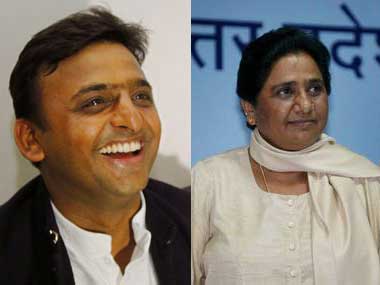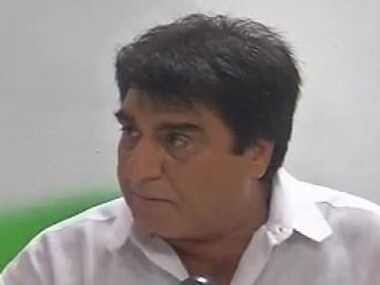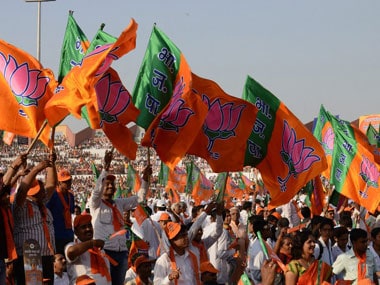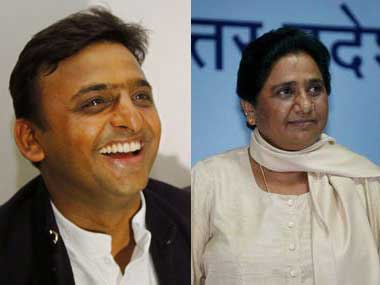The Bahujan Samaj Party's (BSP) decision to support the Samajwadi Party in by-elections for Phulpur and Gorakhpur parliamentary constituencies is a win-win strategy, at least temporarily. Regardless of who wins the by-elections, the BSP will get the SP's support to send a member to the Rajya Sabha. This bargain has come cheap for the BSP — it wasn't required to make sacrifices, as it does not field candidates in by-elections unless it rules the state.
At the same time, the BSP has also not foreclosed its future options by supporting the SP in Phulpur and Gorakhpur. This is amply evident from what BSP chief Mayawati told some zonal coordinators, who constitute the party's pivot at the grassroots, on 1 March. She said she had no plans to stitch alliances with other parties, proffering the same reason she had many times in the past: While the BSP is able to transfer its votes to other parties, their voters, presumably because of their disdain for Dalits, don't support its candidates.
Mayawati's remark should inject realism into the expectations of those who believe there is a front in the making to take on the Bharatiya Janata Party (BJP). "We are still far away from it. The BSP's decision to support the SP is at best a trial balloon," said an important party functionary present at the meeting. "Perhaps she will see the results of the by-elections and take a call."
Mayawati's order is treated in the BSP with the same infallibility as the commander-in-chief's in the army. Yet, the BSP's support to the SP has spawned hopes of an alliance because of the emerging political trends.
For one, the BJP's unabated rising political graph threatens the existence of both SP and BSP in Uttar Pradesh, where it has become imperative for them to survive to fight another day.
Moreover, apart from Prime Minister Narendra Modi's popularity and the financial resources the BJP boasts of, it is almost a certainty that Hindutva, repackaged as the Ram Temple issue, will dominate politics in the months leading up to the 2019 elections.
This is because the three-member bench of the Supreme Court hearing the Ayodhya dispute is expected to deliver its judgement before 2 October, the day Chief Justice Dipak Misra retires. It is he who heads the three-member bench; he wouldn't have decided on hearing the case had he not been reasonably sure of handing out a judgment before his superannuation.
A judgment in favour of Hindus will have the BJP turn the construction of a Ram Temple in Ayodhya into an elaborate show, its impact multiplied manifold through TV coverage. Hindu triumphalism will become the lightning rod for political mobilisation. A verdict favouring Muslims will prompt the BJP to ask the electorate for a mandate massive, enough for it to overturn the court's judgment through legislation.
Either way, Hindutva will be the flavour of the 2019 election campaign. SP and BSP's supporters will also be as susceptible. These two parties represent the quest of middle castes and Dalits to capture power. It will be in their interest to stall Hindu consolidation behind the BJP.
Their position will, however, become tricky if the Supreme Court's verdict is to endorse the claims of Muslims to the site where the Babri Masjid once stood. Will the SP and the BSP join the chorus against the removal of the makeshift Ram Temple in Ayodhya? The need for them to take a position on the temple will not arise in case the verdict upholds the claims of Hindus. Either way, both will need an issue to counter Hindutva's edge.
It is a political truism that Hindutva seeks to create a larger Hindu identity in the hope of diluting caste identities, which both SP and the BSP will seek to sharpen. This is their only method of survival, a fact SP leader Akhilesh Yadav realised after the drubbing his party received in the 2017 Assembly elections. For all his efforts at appropriating the development plank and adopting modernistic rhetoric, the upper castes largely did not vote for him. In their eyes, he was and will remain a Yadav, or at best, an Other Backward Class (OBC) leader.
This is precisely why Akhilesh is using the two bypolls to signal to OBC groups other than his own Yadav caste that he is willing to accommodate their interests. It is to forge a larger OBC unity for himself that he has fielded Pravin Nishad, who is the son of Sanjay Nishad, founder of the Nirbal Indian Shoshit Hamara Aam Dal or Nishad Party, on the SP ticket from Gorakhpur. Whether or not Pravin manages to win, his candidature has certainly turned the spotlight on the Nishad party, a matter of some importance to the caste.
Likewise, the SP has fielded Nagendra Patel, a Kurmi, from Phulpur. Akhilesh was reportedly willing to sponsor a candidate of the Apna Dal, a Kurmi-based party, there. His only condition was that s/he would have to fight on an SP ticket, which is said to have been the reason why a deal between the SP and the Apna Dal failed to fructify.
Akhilesh also extended the policy of accommodation to Mayawati, agreeing to support her party's candidate in the Rajya Sabha elections. It is debatable whether Dalits in Gorakhpur and Phulpur will take cue from Mayawati at this late stage to vote en bloc for the SP. Yet, Akhilesh has agreed to the bargain largely as a confidence building measure with the BSP leader.
Akhilesh faces a threat not only from Hindutva, but also from the BJP's policy to sub-categorise the OBCs for availing benefits of reservation. This process, likely to be completed in April, will divide OBCs into three categories and apportion 27 percent reservation among them. The most backward of OBCs are likely to corner maximum share, and the better-off groups, like Yadavs and Kurmis, will be assigned a slim portion. It will become a tool for dividing the OBCs, against which Akhilesh's policy of accommodation is aimed.
As such, there is a conflict of interest between landholding OBCs and Dalits, who constitute landless labour, in large swathes of rural Uttar Pradesh. This contradiction was one reason why the SP-BSP alliance, forged after the demolition of the Babri Masjid in 1992, collapsed in 1995.
But there are two reasons why Mayawati will want bygones be bygones. One, the BJP under Modi has been concertedly wooing Dalits, particularly the non-Jatav groups. An alliance with the SP will convey the perception that she can turn the corner, and therefore, diminish the possibility of desertion. Two, it will prevent the fragmentation of Muslim votes, as important for her as it is for Akhilesh.
It is easier for them to stitch an alliance for the 2019 Lok Sabha elections as there is no post of chief minister to fight over. For them, it is important to stave off the BJP before they choose to battle each other for power in the state four years later. Until then, they can claim that after failing to deliver on development, the BJP has brought back the Hindutva card to deny power to non-upper castes.
In such a scheme, the Congress does not fit. Given that its own leadership still remains largely upper caste, the Congress can't openly endorse the caste card, even thought it might seem a potent antidote to Hindutva. For instance, its alliance with the SP deprived the Congress of whatever Brahmin votes it had been getting in its decades of wilderness. Its other problem is that has no distinct support base of its own, a base it can offer to transfer to other parties in a quid pro quo.
The role best suited for the Congress therefore is that of a splittist: To take away as many upper caste votes from the BJP as possible to help the SP or BSP to win. In return for playing such a role, the SP and the BSP will field weak candidates in a handful of constituencies where it has been traditionally strong. For the Congress, like the SP and the BSP, it is vital that the BJP, particularly Modi, does not get another five-year shot at power.
Thus, the real significance of Phulpur and Gorakhpur is that it is a precursor to the caste battles of 2019. An SP-BSP alliance will turn the battle equal or else the BJP will walk all over them.
Published Date: Mar 06, 2018 10:50 AM | Updated Date: Mar 06, 2018 10:50 AM













